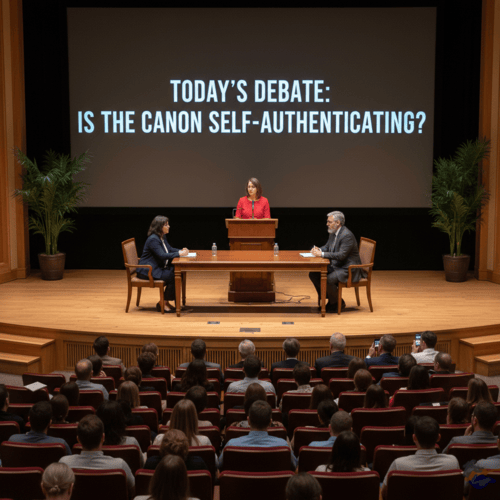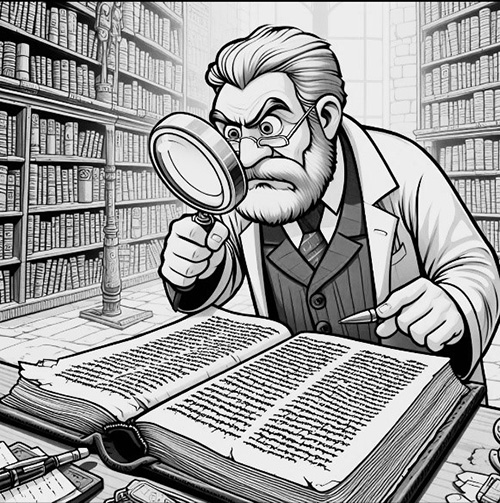Is the Biblical Canon Self-Authenticating?
How do we know the Bible is really God’s Word?
It’s a question that keeps seminarians up at night and sends seekers down rabbit holes of church history. Press the issue, and we discover most answers fall into one of two camps. The Roman Catholic says, “Trust the Church—she gave you the Bible.” The liberal scholar says, “Communities constructed the canon through political processes; it’s basically a curated anthology.”
But there’s a third way, and it’s the one the Reformers recovered from Scripture itself: the canon authenticates itself. Not through circular reasoning. Not through mere subjective feeling. But through intrinsic divine qualities recognised by God’s people through the Spirit’s illumination.
WHAT “SELF-AUTHENTICATING” ACTUALLY MEANS
Reformed scholar Michael Kruger offers a striking analogy: the canon authenticates itself the way light authenticates itself—by shining. We don’t prove light exists by appealing to something brighter. Light is self-evidently light. We experience its illumination directly. Similarly, Scripture’s divine qualities are self-evident to those with eyes to see. The Word of God bears the unmistakable stamp of divinity, and God’s sheep recognise their Shepherd’s voice.
This stands in sharp contrast to the two dominant alternatives:
- Rome insists the Church gave us the canon, and therefore Church authority precedes and validates Scripture. The magisterium becomes the ultimate arbiter.
- Liberal scholarship, meanwhile, views the canon as a human construction—communities decided which books served their interests and political manoeuvring at councils and power dynamics determined which books made the cut. It’s anthology, not revelation.
But here’s what self-authentication isn’t: radical individualism. It’s not “every book feels right to me personally” or “I had a spiritual experience with Tobit, so it’s Scripture.” That’s the caricature critics love to attack. True self-authentication is corporate, historical, and Spirit-illumined. The early church didn’t invent apostolicity; they recognised it. They discerned divine qualities that were objectively present in the texts. This wasn’t 27 books winning a popularity contest. It was the covenant community, across centuries and continents, recognising the same divine voice.
THE THREE INTERNAL MARKS: A WATERTIGHT FRAMEWORK
Kruger provides a helpful threefold framework that shows how self-authentication actually works. Think of it as a three-legged stool—remove any leg, and the whole thing collapses.
First, divine qualities. The canonical books bear intrinsic marks of divinity. This isn’t about subjective preference; it’s about objective characteristics. These texts display unique theological coherence—a unified redemptive-historical narrative from Genesis to Revelation that no human committee could fabricate. They claim divine origin explicitly (2 Timothy 3:16 doesn’t say “some scriptures are inspired”; it says “all Scripture”). They possess transformative power that has reshaped civilisations and individual hearts for two millennia.
Michael Horton emphasises what the Reformers called the “majesty” of Scripture—it speaks with God’s own voice. When we read Isaiah 40 or Romans 8, we’re not encountering mere religious literature. We’re encountering the living God addressing us directly. The texts themselves claim prophetic-apostolic authority: “Thus says the Lord” isn’t a rhetorical flourish; it’s a divine speech act. These qualities aren’t hidden—they shine forth to anyone who engages the texts honestly.
Second, corporate reception. Here’s where history matters. The church didn’t create the canon at some fourth-century council, rubber-stamping a list after centuries of confusion. The church recognised what was already functioning as Scripture. This is critical: reception patterns across geography and time reveal remarkable consensus.
The early church operated with functional canons long before formal declarations. Books like Matthew, John, Romans, and 1 Corinthians were never in dispute—they were read in worship, cited as authoritative, copied and circulated immediately. The Muratorian Fragment, dating to around 170 AD, shows widespread agreement on most of our New Testament more than 150 years before the Council of Nicaea. When there was debate—over books like 2 Peter, Jude, or Revelation—it proved the church was being careful, not arbitrary. They were asking: Does this bear apostolic authority? Does it cohere with the Rule of Faith? Has it been received by the churches?
The canon is what Kruger calls an “organic” collection, not an “imposed” one. Like a river carving its own course, the canonical books established themselves through their intrinsic authority and providential preservation. The church recognised the river’s flow; it didn’t dig the channel.
Third, the Spirit’s internal testimony. This is Calvin’s distinctive contribution, and it’s essential. The Holy Spirit—the same Spirit who inspired Scripture—now moves God’s people to recognise it. When a believer reads Scripture, the Spirit testifies: “This is the voice of your God.”
Horton puts it clearly: “The Spirit doesn’t give new revelation but awakens us to the revelation already given.” This prevents two errors.
- It prevents individualism because the Spirit works corporately across the church.
- It prevents cold rationalism because we can’t argue someone into recognising Scripture’s authority apart from the Spirit’s work. It’s like explaining colour to someone blind from birth—until the Spirit opens eyes, the divine qualities remain invisible.
The integration is watertight: divine qualities provide objective grounds, corporate reception provides historical validation, and the Spirit’s testimony provides experiential confirmation. All three work together. You can’t pit them against each other without undermining the whole edifice.
ANSWERING OBJECTIONS
“But the church chose the canon!” This is the most common objection, and it confuses recognition with creation. Yes, the church recognised the canon—but recognition isn’t the same as creation. A jeweller recognises a diamond’s value; he doesn’t make it a diamond. The church discerned which books bore apostolic authority; it didn’t grant that authority.
The canonical books were already in circulation with divine authority in the apostolic age. Paul’s letters were treated as Scripture during his lifetime (2 Peter 3:16). The Gospels were read as authoritative accounts of Jesus immediately. The church’s formal recognition simply acknowledged what was already true. The canon is discovered, not decided.
“What about the Apocrypha?” Why did the Reformers reject books that Rome accepts? Because they applied the same criteria the early church used. The Apocrypha lacked apostolic origin—they were written in the intertestamental period, not by prophets or apostles. They weren’t received universally—even Jerome, translating the Latin Vulgate, doubted their canonicity. And they contain theological errors that contradict canonical Scripture: prayers for the dead (2 Maccabees), salvation by almsgiving (Tobit), even a bizarre account of Tobit being blinded by sparrow droppings (you can’t make this up).
The Reformers weren’t rejecting tradition capriciously. They were recovering the early church’s own standards. The Apocrypha fails the divine qualities test.
“Isn’t this circular reasoning?” Only if you demand external validation for your ultimate authority—but that’s a demand no worldview can meet. All foundational claims are “circular” in this sense. You can’t prove logic without using logic. You can’t validate sense perception without using your senses. The question isn’t whether you reason in a circle, but which circle you reason in.
For Rome, ultimate authority is the magisterium—but how does one authenticate the Church? By what external standard do we validate the Pope’s claims without begging the question? For liberal scholars, it’s academic consensus—but scholars disagree constantly, and today’s consensus becomes tomorrow’s embarrassment.
For the Reformed, Scripture’s self-authentication mirrors how God Himself is known: by His own self-revelation. God doesn’t submit to a higher tribunal. He is the tribunal. As Horton writes, “God is His own interpreter.” That’s not circular; it’s foundational.
“This sounds too subjective.” It would be, if it were merely individual. But it’s not. The Spirit’s testimony is corporate—millions of believers across two millennia recognised the same divine voice. It’s objective—grounded in the texts’ own claims and qualities, not our preferences. And it’s public—the church’s reception provides historical verification.
This isn’t “my truth.” It’s our recognition of God’s truth. There’s a world of difference.
WHY THIS MATTERS TODAY
In an age where everyone has “their truth” and “lived experience” trumps objective reality, the self-authenticating canon anchors certainty in God’s voice, not human votes. Against postmodern fluidity, it declares: Scripture’s authority doesn’t derive from us. We don’t constitute it; we recognise it.
The self-authenticating canon means Christians can say with confidence: “Thus says the Lord.” Not because a church council declared it in the fourth century. Not because we prefer these particular books. But because God has spoken, His Word bears the unmistakable marks of His voice, and His sheep—by the Spirit’s grace—hear and recognise their Shepherd.
That’s the only ground solid enough to stand on when everything else is sinking sand.
RELATED FAQs
Did the apostles themselves recognise other New Testament books as Scripture? Yes, and it’s remarkable how early this happened. Peter explicitly refers to Paul’s letters as “Scripture” in 2 Peter 3:15-16, placing them on the same level as “the other Scriptures.” Paul quotes Luke’s Gospel as “Scripture” in 1 Timothy 5:18, combining Deuteronomy with Luke 10:7. This shows the New Testament canon was forming organically during the apostolic age itself, and not centuries later through ecclesiastical decree.
- What about books like the Shepherd of Hermas that were almost included? The Shepherd of Hermas and books like 1 Clement were valued for edification but never confused with apostolic Scripture, even by their admirers. Eusebius (4th century) explicitly categorised them as “disputed” or “recognised” writings—useful but lacking apostolic origin. What’s striking is the church’s careful discernment proves the process wasn’t arbitrary; they wrestled precisely because they cared about genuine apostolic authority. The fact that these books ultimately didn’t make the cut demonstrates the rigorous criteria at work.
- How does John Frame’s epistemological approach support self-authentication? Frame argues all knowledge relies on “triperspectivalism”—the normative (what God says), situational (objective reality), and existential (personal experience) working together. Applied to the canon, the normative is Scripture’s own claims, the situational is its historical reception and divine qualities, and the existential is the Spirit’s testimony to believers. Self-authentication, then, isn’t an isolated claim but fits the broader pattern of how we know anything to be true. You can’t escape starting somewhere; Christians start with God’s self-revelation.
What did Westminster divine William Whitaker say about Roman Catholic claims? Whitaker, debating Cardinal Bellarmine in the 16th century, devastated Rome’s position with a simple question: how do you know the church is infallible? If you say “Scripture tells us,” you’ve made Scripture the ultimate authority. If you say “the church tells us,” you’re reasoning in a circle far more viciously than Protestants allegedly do. Whitaker argued Rome’s real problem was epistemological: they needed an external validator for Scripture but couldn’t provide one for the church without begging the question. The Reformers were simply more honest about where ultimate authority must rest.
- How did RC Sproul explain the difference between canon and authority? Sproul emphasised the canon doesn’t give books authority; it recognises which books already possess divine authority. The canon is a list, not a source. Think of it like a thermometer measuring temperature—the thermometer doesn’t create the heat; it registers what’s already there. Sproul loved to say Scripture’s authority is “ontologically prior” to the church’s recognition, meaning the books were authoritative the moment they were written by the apostles and prophets. The church’s later formal acknowledgement simply made explicit what was already implicit and operative.
- What role does the “Rule of Faith” play in canon recognition? The Rule of Faith—the early church’s summary of apostolic teaching (think proto-creed)—served as a standard for measuring books claiming apostolic authority. Scholars like JND Kelly and more recently Kruger show the early church asked: does this book cohere with the apostolic gospel we’ve received? Books teaching Gnostic cosmology or denying Christ’s physical resurrection failed this test. The Rule wasn’t above Scripture but was itself derived from Scripture, creating a mutually reinforcing relationship. It’s like tuning forks—genuine apostolic books resonated with the apostolic message already being taught and believed.
How do apologists like James White respond to the “canon within a canon” objection? White argues that liberal scholars who claim everyone operates with a “canon within a canon” (prioritising some books over others) confuse emphasis with authority. Yes, Christians might quote Romans more than Jude, but that’s about theological density, not canonical status. The Reformer’s sola scriptura means all Scripture is authoritative, even if all parts aren’t equally clear or central. White points out that liberals revealing their own selective reading doesn’t prove the Protestant position is arbitrary—it proves liberals reject the very concept of divine authority. When you deny God spoke equally through all canonical books, you’re no longer debating which canon but whether there’s a canon at all.
OUR RELATED POSTS
Editor's Pick

GPS Without Eyes: How Ants Silently Shout Intelligent Design
Picture a leafcutter ant navigating the rainforest floor in pitch darkness, carrying a leaf fragment 50 times its body weight. [...]

Born Broken: Why Must We Affirm Original Sin?
Imagine a world where we’re born neutral—free to choose good, and without a bias toward evil. Sounds appealing… until we [...]

Does God Truly Care About My Everyday Choices?
OWe believe God created the universe. We believe He orchestrated the exodus from Egypt and raised Jesus from the dead. [...]
SUPPORT US:
Feel the Holy Spirit's gentle nudge to partner with us?
Donate Online:
Account Name: TRUTHS TO DIE FOR FOUNDATION
Account Number: 10243565459
Bank IFSC: IDFB0043391
Bank Name: IDFC FIRST BANK






